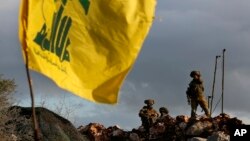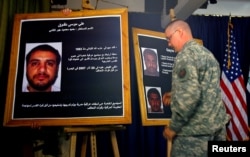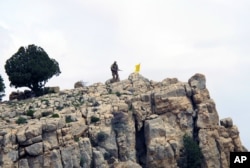A Hezbollah commander who allegedly headed a 2007 raid on an American base in Iraq, which ended with the slaying of kidnapped American soldiers, is now building a secret force that could attack Israel from Syria, according to an Israeli military intelligence report.
Their report was released in the days leading up to a visit to Israel by U.S. Secretary of State Mike Pompeo, who also is stopping in Kuwait and Lebanon, where discussions will include the threat of Iran and Hezbollah.
The force that Ali Musa Daqduq is building could be used to widen a front with Israel in case of another clash with Lebanon. Hezbollah also could launch attacks only from Syrian territory in an effort to spare Lebanon from painful Israeli retaliations, Yoram Schweitzer of the Institute for National Security Studies in Tel Aviv said in an interview.
Israel and Lebanon have amassed such a destructive capability on both sides of the border that they deter one another there. Hence, Israeli attacks on convoys of arms for Hezbollah were targeted when they were in Syria, not Lebanon.
Daqduq, who also is known as Ali Hussein Sajid, joined Hezbollah a quarter-century ago. He was involved in attacks on Israeli forces in southern Lebanon, trained militants in Iran and Iraq, established cells in Iraq to fight American and Iraqi forces, and commanded the January 2007 raid on an American base in the Karbala region. There, raiders wearing American-style uniforms killed a guard and abducted four soldiers who were later executed. British troops arrested Daqduq in Basra two months later; he was in jail, without trial, until the American withdrawal from Iraq.
The security agreement with Iraq required that its government would have to concede to transfer individuals into or out of the country, so an American idea of transferring him to Guantanamo was dropped, the Israeli Meir Amit Intelligence and Terrorism Information Center noted. The Iraqis returned him to Lebanon in 2012, citing a lack of evidence. He then became responsible for training Hezbollah's Special Forces, the Israeli intelligence report said.
Golan File
The new buildup, called the Golan File, started last summer in the northern tip of the Golan Heights, close to Lebanon. The recruits come from the town of Quneitra and several villages such as Hader, Arneh and Khan Arnabeh, some of which are Druze. The Druze community did not join the rebellion against Syrian President Bashar al-Assad.
The report suggested the recruits "joined for financial reasons."
While some of the men had been trained in sabotage, sharpshooting, and firing mortars and Grad rockets, they now engage in gathering intelligence on Israel, sometimes from Syrian army positions along the border. They patrol the border to familiarize themselves with the terrain and analyze infiltration routes, but the network is still "in initial stages of establishment and recruitment and is not yet operational," the intelligence report added.
The men's light arms and anti-tank missiles have been in the area during the civil war, but the report anticipates attempts to deliver additional weaponry from Lebanon "or avail themselves of the existing arsenals kept by Hezbollah and Iran in Syria."
The Golan File is very secret, compartmentalized, and has been initiated "without informing the Assad regime," the report noted. Assad is "sitting in his office and doesn't know about it."
Earlier attempts to establish buildups on the Golan crashed when commanders assigned to the task — Samir Kuntar and Jihad Mughniyah — were killed. Israel was the immediate suspect but never assumed responsibility for their deaths.
Israeli preparations
Hezbollah apparently knows that Assad wants to stabilize the area and doesn't want to give Israel reasons to strike there. In an attempt to nudge him, the Israeli report argued that, "Now, with the end of the [civil] war in sight, Hezbollah has lost its legitimacy to stay in Syria."
Russia, too, would not want to see clashes there. "The Russians have a growing interest in security stability of the Assad regime," the report noted.
Israeli troops, meanwhile, have stepped up their preparations for an encounter, with more elite forces deployed there. Israel strengthened its intelligence-gathering capabilities and established new hidden routes, said the commander of the division that is deployed on the Golan, Brig. Gen. Amit Fisher.
The military "will act with full force to push it away from the Golan front," he added.
Prime Minister Benjamin Netanyahu said, "Israel knows what you're doing; Israel knows where you're doing it. What we've uncovered today is just the tip of the iceberg. We know a lot more."






